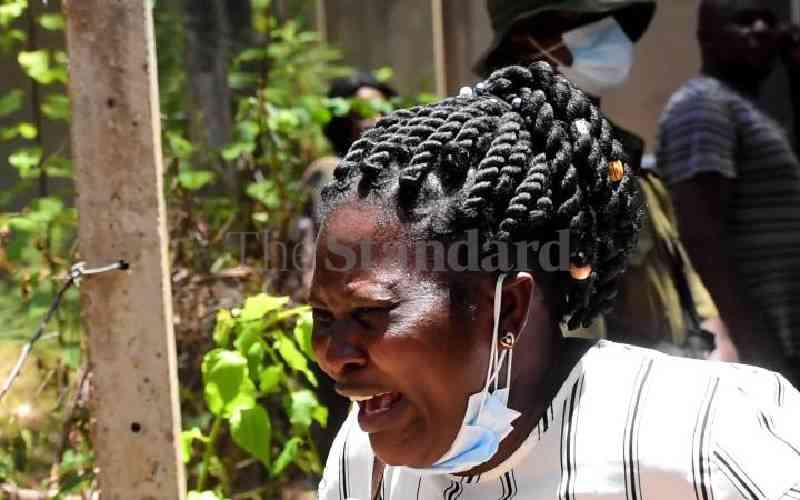I write today to mourn Senator Gerald Otieno Kajwang’ of Homa Bay. Otieno Nyakwar Nyakwamba. Otieno DeLoks, as I used to call him, meaning “Okil Kamaloka”, which in Dho-Luo simply means “the lawyer who can turn everything around, so even a lie becomes the truth.”
Mourning somebody who has passed on in Luo culture is more than just weeping. There are ingredients of mourning which accompany others like praising, remembering the past, celebrating the life, chasing away the evil spirits which bring bad luck (hence “tero buru”) and coming together with relatives and friends to say goodbye at burial time.
To do all this in writing is not easy. But I will cry Nyakwar Nyakwamba through the written word so that future generations will remember this great son of Kenya, this orator, this mover of crowds, this fighter who stood tall in the struggle for our Second Liberation.
At the University of Nairobi in the late seventies and early eighties progressive forces, among both students and staff, did not take kindly to the authoritarian regimes that Kanu presided over.
Political repression had gone overboard, not only through assassinations and detentions without trial, but also through the surreptitious activities of the Special Branch and a plethora of informers who were a constant menace to civil liberties and intellectual thought.
Singing like parrots in tune with Kanu was what the political establishment preached. We decided to resist this underdevelopment of the mind and dehumanisation of Kenyans with all our might, reminding them that we could not keep quiet while this “national choir of looters” was raping our resources.
Otieno Kajwang’ was one of those in the student body who was at the forefront of this onslaught against the regime.
For this, he was expelled and had to finish his education at Makerere University through the help of progressive lecturers at the University of Nairobi.
Eventually qualifying as a lawyer, Kajwang’ did not let go his progressive credentials. Although he did not come to Parliament until 1997, he was very active in formation of the original FORD and the struggles that ensued in FORD-Kenya leading to the birth of the Liberal Democratic Party (LDP).
He quickly cut himself a clear niche in Parliament as an eloquent debater, always advancing his arguments with illustrations and imageries that were as lively as they were amusing, as serious as they at times bordered on the ridiculous.
On top of that, Kajwang’ had this knack of wittingly laughing at his own arguments, with a quiet chuckle and facial expression that no doubt conveyed the seriousness of what he was saying.
By the time Kajwang’ became Homa Bay Senator, he had completely mastered his own art of debate and delivery. I would not be straying from the truth were I to say that not a single Senator would fail to pay attention when Kajwang’ was speaking.
In the event, however, that he noticed some private conversation going among some of his colleagues while he was on his feet, he would be quick to draw the attention of the Speaker to remind the honourable senators that “the Senator for Homa Bay, who no one here can afford to ignore, is currently addressing the nation.”
Kajwang’ used to sit two rows behind me in the Senate chamber, somewhere not far from the main door. A few weeks ago, I was due to be traveling to Mexico as part of the Senate Committee on Devolution.
I was under pressure to leave the Senate to go and prepare for the journey that afternoon but there were important Bills to be voted on which necessitated my delay.
Stay informed. Subscribe to our newsletter
As I stood up to go and make a phone call in a room behind the Speaker’s chair, he beckoned me to his seat to discuss something. As I sat down he seemed very serious.
“Look here Prof,” he started. “We must be very very careful with this thing called devolution. We fought for devolution not to help a few individuals but to help our people. I don’t know what you think but I have realised that even some of our own people will easily help defeat devolution. And it will not take long.”
Then I asked him: “DeLoks, what do you mean?”
“We know of course that there are entrenched forces in Jubilee and the old order who don’t want devolution. These are the enemies we know. The enemies we must be very careful about are those who think devolution means devolving corruption from the central government to the counties. I want you as our SG to think very carefully about this: and the party must take a stand on this. Now you can go.”
And with his characteristic laugh he shook my hand and I left to go and make my phone call. That scene revisited me when, one early morning last week while in London, I woke up to find a message on my phone that Kajwang’ was no more. For a moment, I thought something was wrong somewhere. But after a few phone calls to Nairobi, the message gradually sank in and reality sat on me like a bull elephant, too uncomfortable to bear.
Let me repeat something I said in this column last week: it was not by mistake that God inspired Kajwang’ to lead in the chorus of “Bado Mapambano.”
A very dangerous idea is creeping among some of our young politicians that politics is about money and it is about being elected to Parliament at whatever cost and through whatever route.
I hear it sometimes argued that “if the other side can rig elections to get into power why can’t we?” We can’t do that. We fought and won the Second Liberation through sacrifice, commitment to social justice, love of freedom and respect for the rule of law.
That is why as long as those who get into power by sabotaging these values are still in power, we shall fight them with the best weapon we know how to use: the democratic weapons.
Hence Kajwang’ lives: Bado Mapambano.
 The Standard Group Plc is a
multi-media organization with investments in media platforms spanning newspaper
print operations, television, radio broadcasting, digital and online services. The
Standard Group is recognized as a leading multi-media house in Kenya with a key
influence in matters of national and international interest.
The Standard Group Plc is a
multi-media organization with investments in media platforms spanning newspaper
print operations, television, radio broadcasting, digital and online services. The
Standard Group is recognized as a leading multi-media house in Kenya with a key
influence in matters of national and international interest.
 The Standard Group Plc is a
multi-media organization with investments in media platforms spanning newspaper
print operations, television, radio broadcasting, digital and online services. The
Standard Group is recognized as a leading multi-media house in Kenya with a key
influence in matters of national and international interest.
The Standard Group Plc is a
multi-media organization with investments in media platforms spanning newspaper
print operations, television, radio broadcasting, digital and online services. The
Standard Group is recognized as a leading multi-media house in Kenya with a key
influence in matters of national and international interest.







